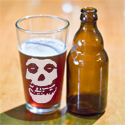|
Roundboy posted:so now im just waiting till my 1/3rd drop.. and possibly pitching something to adjust Ph level ? Absolutely, a pain in the rear end. I've found what works the best is to mix it with some water, then put it through a funnel. It will get gunk stuck in the funnel. Then you get something that can jam the gunk through the funnel hole and repeat. over and over and over gain.
|
|
|
|

|
| # ? Apr 18, 2024 20:35 |
|
RagingBoner posted:I vote option 4: rack it, keg it, carb it, and keep it stored cold on pressure. Everything I've heard says that beer stored cold on pressure basically never goes bad. In fact, I've heard from the guys at the LHBS that they bought a bunch of used, supposedly empty sanke kegs from a shipping company. Apparently the kegs were paid to be shipped, but then something went wrong with the addressee and they never cleared it up, so they just sat around for 2-3 years. On an asphalt parking lot. In Arkansas weather. That's a crazy story. 3 years! If it doesn't really matter if I leave them or I keg and carb them I'll probably just leave them - just because the temptation to drink them won't be there. 
|
|
|
|
Goonicus posted:That's a crazy story. 3 years! If it doesn't really matter if I leave them or I keg and carb them I'll probably just leave them - just because the temptation to drink them won't be there. As someone who just lost 35 lbs on Atkins, I feel your pain about cutting out booze. But it worked!
|
|
|
|
RagingBoner posted:Man, I was afraid you'd say that. Without racking off and homogenizing your beer, you won't end up with the best product you could have had. I transferred it all to another container with the priming solution and mixed gently before transferring back into the fermenter and bottling. Hopefully this homogenized it enough. Nothing left to do but pray I don't have bottle bombs or poison myself in some way. Thanks a lot for your help  I'm going to start another batch next week so im off to tinker on brewtoad. I will be able to get a proper siphon by the end the time my next batch is ready to bottle. I'm going to start another batch next week so im off to tinker on brewtoad. I will be able to get a proper siphon by the end the time my next batch is ready to bottle.
|
|
|
|
Midorka posted:Remember that temperature of the beer at bottle carbing time is important. I was under the impression that the fermentation temperature was the key piece of data when calculating the amount of priming sugar to use. I have been fermenting at about 65F for two weeks, then putting the bucket in my refrigerator until cold, then adding gelatin finings. I bottle a couple of days later, using the fermentation temperature to calculate the amount of priming sugar. I am not 100% sure this is the right way to do things, but it seems to have worked so far.
|
|
|
|
PBCrunch posted:I was under the impression that the fermentation temperature was the key piece of data when calculating the amount of priming sugar to use. The temperature of the beer needs to be taken before bottling. That will determine how much sugar you need. I believe it is important because different temperatures will have different amounts of carbonation in it. As for it seeming to work so far, it's not. That's why you had bottle bombs. Bottles shouldn't break under minor pressure. How much foam poured from the other bottles when you opened them? As for calculators, I use Northern Brewers. Edit: After reading, a lot of people seem to suggest using the temperature of what the bottles will be sitting at a their warmest after bottling. Midorka fucked around with this message at 16:11 on Aug 16, 2013 |
|
|
|
It's probably not as important as, say, the amount of sugar you prime with. But temp at bottling does matter since the colder a liquid is, the more gas can stay dissolved. So super cold beer already has some CO2 dissolved in it before you even start bottling so you might end up with more than you expect. Also 3 volumes is starting to push it for what you can safely put in a standard beer bottle anyway. I think 3.5 is where you really need to look at switching to a big thick champagne bottle like some Belgian styles come in. Regular beer bottles just aren't rated for that. Come to think of it I'm almost positive New Belgium deliberately uses thin wall bottles to reduce the total amount of glass they consume and therefore their environmental impact. Can't find a source on that right now, though. Maybe I heard it on a tour. Edit: Did find this blog post that says they're "Decreasing the weight of our bottles, therefore reducing resource consumption and the impact of bottle transportation." Docjowles fucked around with this message at 16:54 on Aug 16, 2013 |
|
|
|
Midorka posted:The temperature of the beer needs to be taken before bottling. That will determine how much sugar you need. I believe it is important because different temperatures will have different amounts of carbonation in it. This is all sort of right and sort of wrong. The temperature that those calculators want is the highest temperature that the beer reached during fermentation. That determines how much (at most) dissolved CO2 is actually in solution. If you degassed a little, perhaps by racking to a bottling bucket, then there would be less. Bottle bombs are much more likely to result from incomplete mixing of the sugar solution, gross miscalculations or sloppy measurements of volume or priming sugar. The difference in sugar from the NB calculator between 65 and 75 F is only about 10 grams for 2.5 volumes in a 5 gallon batch. Roundboy posted:I saw krausen and yeast bubbling this morning < 12 hours in, so i went ahead and threw in the appropriate amount of yeast nutrient. The first tablespoon full caused a HUGE reaction as it seemed all the yeast bubbled up in the first 2 inches of the must. That was the CO2 coming out of solution which should be happening when you stir up the lees with a long spoon. The idea is just to get all the yeast that settled to the bottom back in contact with the must to help the fermentation along. If you don't have a good way to measure pH then I'd just go ahead and add 0.5 to 1 g potassium carbonate per gallon right now as a buffer. Those pH test strips aren't very accurate in my experience. Marshmallow Blue posted:Edit: @Mouth siphon, This is good news, I need a way to rack my Lambic meads and I don't wanna buy another racking cane. And if any gets in my mouth, that's kind of like a small victory because it tastes great. It's probably ok for a lambic but your mouth is filled with bacteria. There's probably enough alcohol in stuff to keep them in check but why take the chance? Fill your tubing up with water, cap one end with your finger, put the other end into your source container. Hold the capped end over a spare bucket or jar and let go until all the water runs out, then cap it again and move it over to the receiving container and let go to siphon.
|
|
|
|
THE LUMMOX posted:Thanks a lot for your help. I don't have a siphon nor an easy way to make one. I was planning on bottling by holding the bottle opening right up to the fermenter tap. This will work fine, you'll just end up with with more sediment (as pointed out), and you'll need to make sure the sugar solution is well stirred through. The sediment isn't that big a deal, just make sure not to rock the fermenter while filling, once the bottles are cold you'll find you can pour off the beer with little sediment. Did your fermenter come with a bottling wand or plastic tube that fits in the tap?
|
|
|
|
Cpt.Wacky posted:
What? Edit: I'll have to practice a few times to be able to get it right, but its worth a shot.
|
|
|
|
Cpt.Wacky posted:This is all sort of right and sort of wrong. The temperature that those calculators want is the highest temperature that the beer reached during fermentation. That determines how much (at most) dissolved CO2 is actually in solution. If you degassed a little, perhaps by racking to a bottling bucket, then there would be less. Bottle bombs are much more likely to result from incomplete mixing of the sugar solution, gross miscalculations or sloppy measurements of volume or priming sugar. The difference in sugar from the NB calculator between 65 and 75 F is only about 10 grams for 2.5 volumes in a 5 gallon batch. So peak fermentation temperature of the liquid itself is all that matters?
|
|
|
|
Midorka posted:So peak fermentation temperature of the liquid itself is all that matters? Or if you shook it a lot like he said. If we look at carbonation as a whole then if you have a weird serving temperature it may also be different from what you expected. Bottle carbing is some voodoo poo poo that calculators will get you close but in the end you just need to tweak for your set up.
|
|
|
|
zedprime posted:Or if you shook it a lot like he said. If we look at carbonation as a whole then if you have a weird serving temperature it may also be different from what you expected. Bottle carbing is some voodoo poo poo that calculators will get you close but in the end you just need to tweak for your set up. I'm so cool that I put sugar in my bottles. Because adding sugar before bottling still makes no effin sense. Thanks Mr. Beer.
|
|
|
|
I bottled a stout a couple weeks ago and was super paranoid because I used the NB priming sugar calculator and put in the beer's current temp (32ish, I was cold crashing), and then later learned I was supposed to put the max temp the beer had ever gotten (75ish I guess from sitting around my apartment). The difference in priming sugar was quite a bit between those temps so I thought for sure it would be undercarbed. Came out pretty much perfect though. Last Saturday I bottled my raspberry wheat and used room temperature to calculate how much priming sugar I needed. Opened one last night and it was already nice and carbed and drinking amazing. Hopefully that doesn't mean in another week or two it's going to become overcarbonated.... It tasted incredible though, thanks so much for the recipe ChiTownEddie, I think this is going to become a yearly staple.
|
|
|
|
Sirotan posted:Last Saturday I bottled my raspberry wheat and used room temperature to calculate how much priming sugar I needed. Opened one last night and it was already nice and carbed and drinking amazing. Hopefully that doesn't mean in another week or two it's going to become overcarbonated.... I'm glad it worked out Note: some raspberry sediment in the bottles was not a bad thing, in the keg? A terrible thing. I shall be filtering this batch WAY better than before haha.
|
|
|
|
Cpt.Wacky posted:
Ill find a good enough mixer and get some potassium carbonate tomorrow when i visit my LHBS. Thanks for that
|
|
|
|
My local homebrew store is putting on an all-grain brewing demo on Sunday. Apparently it's going to be inside the store with a propane burner. This sounds like a bad idea to me, am I missing something? The guy said they already did an extract demo earlier and if anyone died or got sick it would have made the paper in this small town.
|
|
|
|
I've been considering for a while now about getting into winemaking, but before I jump in I'd like to come to the thread for advice. Does anybody here have any experience with making wines? What books are recommended for someone who knows nothing about wines but has some experience with extract brewing?wattershed posted:BIAB stuff Thanks for all this, looks like I'll be trying out my first BIAB recipe next week  I'm thinking I'll go for an all-grain recipe from Radical Brewing and just using BIAB process. I'm particularly looking at these: I'm thinking I'll go for an all-grain recipe from Radical Brewing and just using BIAB process. I'm particularly looking at these:"Fallen Angel Strong Pale posted:Fermentables: Stout Butt Beer, 1720 posted:Fermentables: Note that the original recipes are for 5-gallon batches, and the most I have is a 3-gallon carboy. As such, I've divided all the ingredient amounts by half. The ~ indicates places where I had to round up for the sake of convenience. Anyways, pretty much any large muslin bag worth its salt ought to be able to hold at most 10 lbs of fermentables, right?
|
|
|
|
NEED TOILET PAPER posted:Anyways, pretty much any large muslin bag worth its salt ought to be able to hold at most 10 lbs of fermentables, right? For sure. Also, 6-row? I don't remember the last time I've seen someone bust out a recipe on here with that grain.
|
|
|
|
Midorka posted:So peak fermentation temperature of the liquid itself is all that matters? However, if you let the beer temperature come up to 80F after fermentation is complete, some of that CO2 is going to be lost because the liquid is over-saturated. The CO2 will drop to about 0.69 volumes. If you have some sort of wacky fermentation schedule that starts at 80F then drops it to 70F after 2 days, when you change the temperature you'll have 0.69 volumes but because the yeast are still making CO2 it will go up to 0.82 volumes. After it passes this point, the CO2 will resume gassing out through the airlock. If you make this temperature change after 5 days, odds are you'll end up with closer to 0.69 volumes than 0.82, because the yeast aren't doing much work any more. Long story short, if you ferment for two weeks then cold crash, the number you enter into the calculator is the temperature before crashing. If you cold crash before fermentation is complete, it's a crap shoot what you're going to get. Especially because once you bottle they'll go back to work on the remaining sugar plus the priming sugar and you will kersplode bottles.
|
|
|
|
My friends and I made a 5 gallon batch of wheat beer a little while ago. We've drank over a case's worth and encountered no flat beers or bottle bombs. So what happens when we decide to take some out to classy Thai BYO? Two and a half foot geyser upon opening one. That was fun.
|
|
|
|
wattershed posted:For sure. Maybe the 6-row was to help conversion as the original porter was basically 100% brown malt. edit: I'd use 6-row if I were converting an all grain recipe to partial mash that used a lot of unmalted adjuncts.
|
|
|
|
wattershed posted:For sure. I use 6-row for my Classic American Pils. Just kegged my 1 pound of hops Rye IPA, and man does it taste amazing. code:
|
|
|
|
ScaerCroe posted:I use 6-row for my Classic American Pils. Do you get a "strawberry cream" taste from the Belma? I loved the flavour I got out of mine. I'll be buying a shitload more when they drop again as my 10lb 2-row + 1lb crystal 40 + 60 IBU belma + us-05 simple IPA came out super delicious and unique.
|
|
|
|
I have about 2 lbs of Grade B maple syrup I want to turn into booze. When I make mead, I usually go for between 3-5 lbs of honey per gallon of water depending if I want a dry or sweet finished product, usually settling on the drier side. My best bet for the amount of syrup I have is either a gallon jug or a half-gallon. One would work out to 4 lbs per gallon and is sweeter than I normally go, the other works out to 2 lbs per gallon, which is far drier. For which do you reckon I should go?
|
|
|
|
crazyfish posted:Do you get a "strawberry cream" taste from the Belma? I loved the flavour I got out of mine. I'll be buying a shitload more when they drop again as my 10lb 2-row + 1lb crystal 40 + 60 IBU belma + us-05 simple IPA came out super delicious and unique. I bought 2 pounds of it last fall for really cheap (probably as you did), and depending on the malt bill I got either strawberry, honeydew, or a combo. I think I read what the flavor profile was supposed to be before I tasted it though, which probably influenced my palate. This beer, uncarbed, had an almost tropical flavor to it, so we will see what happens to it. I might have to try your recipe as well, as I love those simple malt bills with tons of fruity hops in it.
|
|
|
|
This post has sparked some debate in the comments due to the last paragraph:quote:As we are leaving I see Čižas trying to give our interpreter a bottle of his beer, and her politely declining, knowing it will not travel well and that we cannot split it. In my mind's eye I see him still, the brewer-philosopher, beaming with arms outstretched, 1-liter plastic bottle in hand, saying "please don't take away from me the joy of giving you a gift". Now that he'd given us the joy of meeting him, how could we? Because of this a user claimed that since their beers are unpasteurized/unfiltered that it dramatically lowers their shelf life to only a few days. I argued that the beer would only have such a short shelf life due to the plastic bottles they package into, or poor sanitation, which I deducted because he said the beer turned sour. Can anyone with more knowledge chime in on this?
|
|
|
|
Welp,I'm not shaking the carboy anymore as I had so much gas come out it blew the stopper off. I got a long still stick and some potassium bicarbonate at my lhbs. Adding about 1/2 tsp per gallon to normalize my PH. Unless there is a different ratio you reccomend untested
|
|
|
|
Midorka posted:This post has sparked some debate in the comments due to the last paragraph: It seems likely that they ferment with a mixed culture including god knows what either on purpose or because of bad sanitation. Plastic bottles should be good for at least a few months worst case so I doubt the bottles enter into it. I could see liking the immediate effects of fast and loose wild fermentation on flavor in young beer and then just never letting beer get old. I suppose filtering or pasteurizing might help but they'd have to get any dirty processes out of the way for it to do any good, and maybe such treatments would unbalance the whole mess and take away the unique flavors they liked in the first place. Kind of reminds me of my attempts at spontaneously fermented cider - seriously fantastic for weeks and then predictably taking some kind of bad turn.
|
|
|
|
 Both of those beers are from the same batch (left is normal). I learned a Bretty important lesson about being lazy with the Oxiclean tonight.
|
|
|
|
Home brewing tip: to ensure complete aeration of your wort, try slipping and falling down the basement stairs while carrying a 5 gallon bucket of wort Hardly spilled any beer though. Glad I wasn't using a glass carboy.
|
|
|
|
 Glad you're ok! Glad you're ok!
|
|
|
|
fullroundaction posted:
What happened? @Thufir, glad you're okay. Accidents like that are exactly why I'm 100% against glass.
|
|
|
|
Midorka posted:What happened? I assume his beer got contaminated with brett and it ate everything.
|
|
|
|
Roundboy posted:Welp,I'm not shaking the carboy anymore as I had so much gas come out it blew the stopper off. Well duh, you're supposed to take the airlock out first. I had a near miss doing that once too. The recommendation for potassium carbonate from MoreFlavor's guide is 0.45 g/gallon. But potassium bicarbonate isn't the same thing. Wikipedia says it acts as a pH buffer but I have no idea how much is appropriate.
|
|
|
|
Just noticed this carboy carrier at $9 shipped, if anyone's still using glass and in need of one. http://www.amazon.com/The-Brew-Hauler/dp/B0064OEKCK
|
|
|
|
wildfire1 posted:I assume his beer got contaminated with brett and it ate everything. Yeah this. I'm not certain but I'm pretty sure the infected ones are in bottles that previously held a batch of Brett saison. I've only encountered 3 so far and they were all gushers. I can't believe the extreme color change. Time to go back to a 2-stage cleanse.
|
|
|
|
Cpt.Wacky posted:Well duh, you're supposed to take the airlock out first. I had a near miss doing that once too. FFFFFFFF i just added some in last night. Googling shows that i didnt just ruin my batch of mead, but yeah, Im not adding any more. I only did about 1=1.5 tsp total. I think that is the last time i let the old guy at the lhbs sell me stuff. but then again, i cant believe they sell two similarly packaged chemicals :/ Either way i have a healthy ferment going, so im going to pull a sample in a couple days and see where i am. EDIT: further searching show potassium CARbonate to be pretty rare at stores, so i was just fine using it... i just need more. Im still holding off using any more sine again, my ferment is chugging along like a champ according to my airlock. Roundboy fucked around with this message at 16:03 on Aug 18, 2013 |
|
|
|
How important are yeast nutrients in big beers and what should I use? I'm doing a 10%+ IPA and I'm really concerned about attenuation since I don't want it to come out a barleywine.
|
|
|
|

|
| # ? Apr 18, 2024 20:35 |
|
NEED TOILET PAPER posted:I've been considering for a while now about getting into winemaking, but before I jump in I'd like to come to the thread for advice. Does anybody here have any experience with making wines? What books are recommended for someone who knows nothing about wines but has some experience with extract brewing?
|
|
|


































